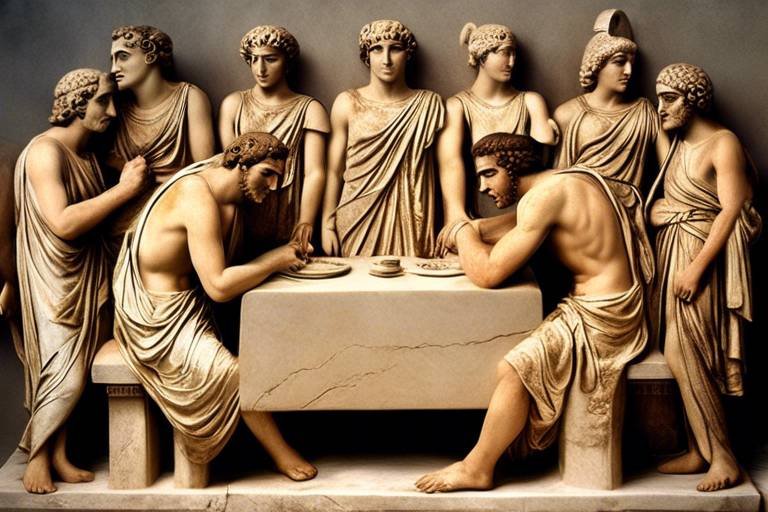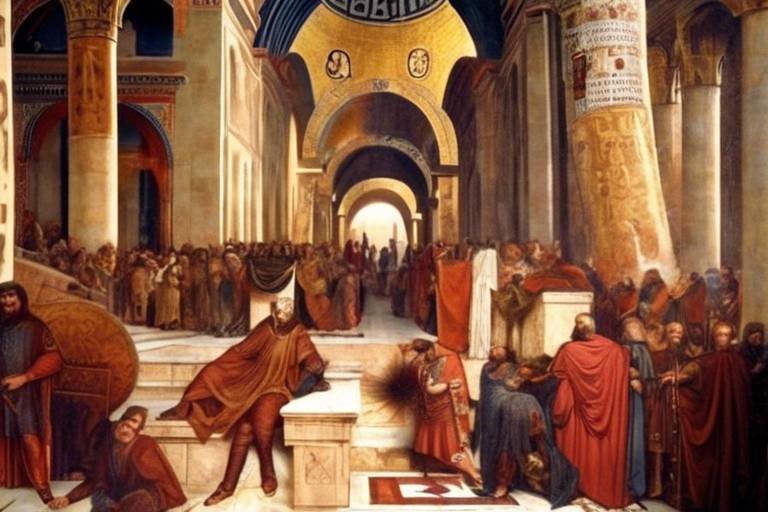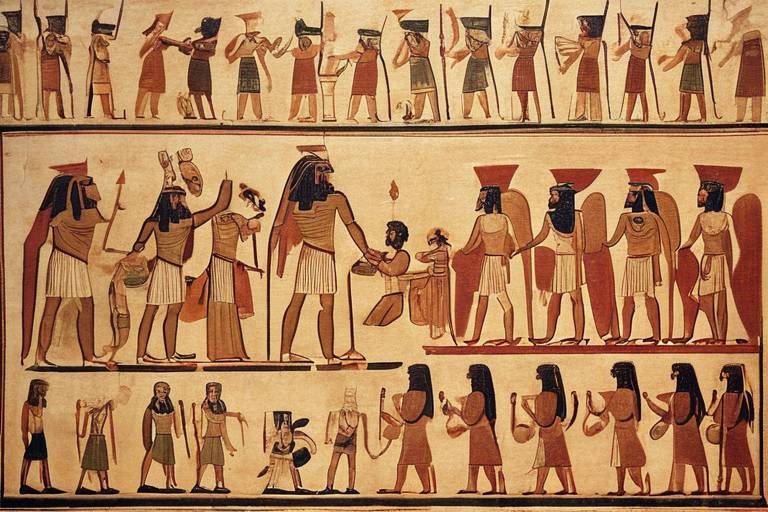The Influence of the Ancient Greeks on Western Culture
The ancient Greeks have left an indelible mark on Western culture, shaping various aspects of our society that continue to resonate today. Their influence can be seen in art, philosophy, politics, language, architecture, and many other facets of modern life. Let's delve into the profound impact of ancient Greek civilization and explore how it has shaped the Western world as we know it.

Artistic Legacy
Exploring the profound impact of ancient Greek civilization on various aspects of Western culture, including art, philosophy, politics, language, and architecture.
The artistic legacy of ancient Greece continues to shape Western aesthetics to this day. Greek art, renowned for its beauty and realism, encompassed a wide range of mediums, from intricate sculptures and elegant pottery to majestic architecture and vibrant paintings. The Greeks' mastery of form, balance, and proportion set the standard for artistic expression in the Western world.
One of the most iconic examples of Greek art is the Parthenon, a magnificent temple dedicated to the goddess Athena, located on the Acropolis in Athens. Its architectural perfection and intricate sculptures exemplify the ideals of harmony and beauty that have inspired artists and architects for centuries.
Furthermore, Greek pottery, with its distinctive black-figure and red-figure styles, not only served practical purposes but also showcased intricate designs and mythological narratives. These ancient vessels are not just containers but pieces of art that reflect the creativity and storytelling prowess of the Greek civilization.
The influence of Greek art can be seen in various art movements throughout history, with artists drawing inspiration from the classical beauty and artistic principles established by the ancient Greeks. From the Renaissance to Neoclassicism, Greek art continues to captivate and inspire artists and art enthusiasts worldwide.

Philosophical Contributions
The philosophical contributions of ancient Greece have left an indelible mark on Western thought, shaping the very foundations of modern philosophy and reasoning. From the profound musings of Socrates, Plato, and Aristotle to the revolutionary ideas of Stoicism and Epicureanism, Greek philosophy laid the groundwork for critical thinking and intellectual inquiry that continues to influence contemporary philosophical discourse.
One of the most significant philosophical concepts to emerge from ancient Greece is the idea of dialectic, a method of argument involving logical reasoning and dialogue to uncover truth. This dialectical approach to philosophical inquiry has permeated Western philosophy, emphasizing the importance of questioning assumptions and seeking deeper understanding through rational discourse.
Aristotle, often regarded as one of the greatest philosophers in history, made substantial contributions to diverse fields such as ethics, metaphysics, logic, and politics. His philosophical works, including "Nicomachean Ethics" and "Politics," have had a lasting impact on Western ethical theory and political philosophy, shaping our understanding of virtue, justice, and the ideal state.
The legacy of Greek philosophy extends beyond academic circles, influencing broader aspects of Western culture such as literature, art, and even everyday language. Concepts like ethics, metaphysics, and epistemology originated in ancient Greek philosophical discourse and continue to inform contemporary discussions on morality, reality, and knowledge.
Moreover, the emphasis on rationality and critical thinking in Greek philosophy has had a profound impact on the development of Western science and intellectual inquiry. The scientific method, rooted in empirical observation and logical reasoning, can be traced back to the philosophical traditions of ancient Greece, highlighting the enduring influence of Greek thinkers on the pursuit of knowledge and truth.

Democratic Ideals
Exploring the profound impact of ancient Greek civilization on various aspects of Western culture, including art, philosophy, politics, language, and architecture.
The origins of democracy can be traced back to ancient Greece, where the concept of citizen participation in governance was born. The democratic ideals established in Greek city-states, such as Athens, laid the groundwork for the development of democratic principles in Western societies.
A key aspect of Greek democracy was the notion of equality before the law and the right of citizens to participate in decision-making processes. This emphasis on individual rights and civic engagement has resonated throughout Western history, shaping the political systems of many modern democracies.
Aristotle, a renowned Greek philosopher, famously stated, "Man is by nature a political animal." This belief in the inherent connection between individuals and their community underscored the Greek approach to governance, emphasizing the importance of collective responsibility and shared decision-making.
The legacy of Greek democratic ideals can be seen in the establishment of representative democracies, where elected officials serve as the voice of the people. The concept of government by the people, for the people, has its roots in the democratic traditions of ancient Greece, continuing to influence the political landscape of the Western world.

Linguistic Influence
The linguistic influence of ancient Greek civilization on Western languages and academic terminology is undeniable. Greek, as one of the oldest recorded languages, has left an indelible mark on the development of language and communication in the Western world. Many English words have their roots in Greek, especially in scientific, medical, and philosophical vocabularies. For example, words like "philosophy" (philosophia), "biology" (bios + logos), and "geography" (geo + graphein) all stem from Greek origins, showcasing the enduring impact of Greek language on intellectual discourse.
Moreover, the Greek alphabet, with its distinctive characters and phonetic system, has influenced the writing systems of many Western languages. The adoption of the Greek alphabet by the Romans and its subsequent evolution into the Latin alphabet further solidified the Greek linguistic legacy in Western civilization. The structure and syntax of Greek have also shaped the grammatical rules and linguistic conventions of modern European languages, highlighting the pervasive nature of Greek linguistic influence.
Furthermore, the translation of ancient Greek texts into Latin during the Renaissance period played a crucial role in the dissemination of Greek linguistic and literary heritage throughout Europe. Scholars and intellectuals of the time studied Greek works extensively, leading to a revival of interest in classical Greek language and literature. This revival not only enriched the vocabulary of European languages but also contributed to the development of modern linguistic theories and methodologies.
In academic circles, the use of Greek terms and expressions continues to be prevalent, particularly in fields such as mathematics, astronomy, and medicine. Terms like "hypotenuse," "galaxy," and "hypertension" are just a few examples of Greek-derived terms commonly used in scientific discourse. The precision and clarity of Greek terminology have made it indispensable in technical and specialized fields, demonstrating the enduring relevance of Greek linguistic influence in contemporary society.

Architectural Innovations
Ancient Greek architecture stands as a testament to the innovative spirit and artistic prowess of this ancient civilization. The Greeks revolutionized architectural design with their development of the three classical orders: Doric, Ionic, and Corinthian. These distinct styles, characterized by their unique columns and decorative elements, have greatly influenced Western building design for centuries.
The Parthenon, a magnificent temple dedicated to the goddess Athena, is perhaps the most iconic example of Greek architecture. Its harmonious proportions, refined columns, and intricate friezes showcase the Greeks' mastery of architectural symmetry and balance. The Parthenon's enduring legacy can be seen in countless government buildings, museums, and monuments around the world.
In addition to temples, the Greeks also excelled in urban planning and public infrastructure. The city of Athens, with its well-designed streets, agora (marketplace), and theaters, served as a model for future urban centers. The amphitheaters and stadiums built by the Greeks not only hosted theatrical performances and athletic competitions but also reflected their commitment to communal gatherings and civic engagement.
Furthermore, the concept of the architectural orders introduced by the Greeks laid the foundation for the development of architectural theory and practice in Western culture. Architects and builders continue to draw inspiration from Greek principles of harmony, proportion, and beauty in creating modern structures that resonate with timeless elegance.
Overall, the architectural innovations of the ancient Greeks have left an indelible mark on Western architecture, shaping the way we perceive and construct the built environment. From grand temples to functional public spaces, the legacy of Greek architecture continues to inspire and awe generations of architects, designers, and admirers worldwide.

Theatrical Traditions
When delving into the rich tapestry of Western culture, one cannot overlook the profound influence of ancient Greek theatrical traditions. The origins of Western theater can be traced back to the dramatic performances of ancient Greece, where playwrights like Sophocles, Euripides, and Aeschylus crafted timeless works that continue to captivate audiences to this day. These early theatrical productions laid the foundation for dramatic storytelling, character development, and thematic exploration in Western performance arts.
A key aspect of ancient Greek theater was the use of masks, which allowed actors to embody multiple roles and emotions on stage. This innovative technique not only enhanced the dramatic impact of the performances but also contributed to the development of theatrical conventions that are still employed in modern theater. The tradition of wearing masks in Greek theater symbolized the transformative power of performance, blurring the lines between reality and fiction.
Furthermore, the structure of ancient Greek plays, with their distinct divisions into prologue, parodos, episodes, and exodus, established a narrative framework that has influenced dramatic storytelling for centuries. The interplay of chorus and characters in Greek tragedies and comedies added depth and complexity to the theatrical experience, setting a standard for the exploration of universal themes such as love, betrayal, fate, and honor.
The legacy of ancient Greek theatrical traditions extends beyond the stage, permeating various forms of contemporary performance arts. From Shakespearean dramas to modern experimental theater, the influence of Greek drama can be seen in the nuanced portrayal of human emotions, the exploration of moral dilemmas, and the use of symbolism and metaphor to convey deeper meanings.
Moreover, the enduring relevance of Greek plays in the theatrical canon highlights the timelessness of themes such as hubris, catharsis, and the struggle between individual will and divine fate. The tragic heroes and heroines of Greek mythology continue to resonate with audiences, inviting reflection on the complexities of the human experience and the consequences of pride and ambition.
In essence, the theatrical traditions of ancient Greece have left an indelible mark on Western culture, shaping the way we perceive and engage with storytelling, performance, and the exploration of the human condition. By honoring and continuing to draw inspiration from the artistic innovations of the past, we ensure that the legacy of Greek theater remains a vibrant and integral part of our cultural heritage.

Olympic Games
The Olympic Games, originating from ancient Greece, represent one of the most iconic and enduring legacies of Greek culture on the Western world. Dating back to around 776 BC, the ancient Olympic Games were a celebration of athleticism, sportsmanship, and unity among Greek city-states. Athletes from various regions would compete in events like running, wrestling, chariot racing, and more, in honor of the gods.
Fast forward to the modern era, the Olympic Games have evolved into a global phenomenon, transcending borders and cultures. Every four years, the world unites in a display of sportsmanship and competition, echoing the spirit of the ancient Greeks. The Olympics showcase not only athletic prowess but also the values of fair play, respect, and excellence.
The revival of the Olympic Games in the late 19th century by Pierre de Coubertin was inspired by the ancient Greek tradition, aiming to promote peace and understanding through sport. The multi-sport event has since grown into the largest international gathering, with thousands of athletes from diverse backgrounds coming together to compete on a world stage.
The Olympic Games have become a symbol of unity, diversity, and friendship, embodying the spirit of cooperation and healthy competition. Through the Olympic movement, the legacy of ancient Greece continues to inspire generations worldwide, fostering peace and harmony through the universal language of sports.

Mythological Legacy
Delving into the of ancient Greece unveils a rich tapestry of stories and characters that have woven themselves into the very fabric of Western culture. The tales of gods and heroes such as Zeus, Athena, Hercules, and Achilles have not only entertained generations but have also served as allegorical reflections of human nature and societal values.
These myths, passed down through oral tradition and later recorded in works like Homer's Iliad and Odyssey, continue to captivate audiences with their themes of love, betrayal, heroism, and tragedy. They have inspired countless works of art, literature, and film, shaping the way we perceive the world and our place within it.
Moreover, the influence of Greek mythology extends beyond mere entertainment, permeating various aspects of modern society. From the naming of planets and constellations to the use of mythological motifs in branding and advertising, the legacy of ancient Greek myths is omnipresent.
Even in the realm of psychology, the archetypes found in Greek mythology have been analyzed by scholars like Carl Jung to understand universal patterns of human behavior and the collective unconscious. The enduring appeal of these stories lies in their ability to resonate with fundamental aspects of the human experience, transcending time and culture.
Frequently Asked Questions
- What is the significance of ancient Greek art in Western culture?
Ancient Greek art holds immense significance in Western culture as it laid the foundation for many artistic principles and styles that continue to influence art today. From the iconic sculptures of gods and goddesses to the intricate pottery designs and architectural marvels, Greek art has shaped the aesthetic sensibilities of the Western world for centuries.
- How did Greek philosophy contribute to modern Western thought?
Greek philosophy introduced groundbreaking ideas and concepts that form the basis of modern Western thought. Thinkers like Socrates, Plato, and Aristotle delved into questions of ethics, politics, metaphysics, and epistemology, setting the stage for the development of logic, ethics, and the scientific method that are integral to contemporary philosophical discourse.
- What is the connection between ancient Greek democracy and Western governance?
Ancient Greece is often credited as the birthplace of democracy, with the city-state of Athens pioneering the concept of citizen participation in government. The democratic ideals of ancient Greece, such as equality before the law and the right to vote, have influenced the evolution of governance systems in the Western world, shaping the principles of modern democracy.
- How has the Greek language influenced Western literature and academic terminology?
The Greek language has left an indelible mark on Western literature and academic discourse through its rich vocabulary and complex grammar. Many English words have Greek roots, and the language's influence can be seen in fields such as medicine, philosophy, and mathematics, where Greek terms are commonly used to describe concepts and theories.
- What are some lasting architectural innovations of ancient Greece?
Ancient Greece is renowned for its architectural achievements, including the development of the Doric, Ionic, and Corinthian orders that continue to inspire modern building design. The use of columns, pediments, and friezes in Greek architecture has had a lasting impact on Western construction methods and aesthetic principles.
- How did ancient Greek theater influence contemporary performance arts?
Ancient Greek theater, with its tragedies, comedies, and satyr plays, laid the groundwork for modern drama and performance arts. The use of masks, chorus, and dramatic structure in Greek plays has influenced theatrical traditions around the world, shaping the way stories are told and emotions are conveyed on stage.
- What is the cultural significance of the ancient Greek Olympics?
The ancient Greek Olympics were more than just sporting events; they were a celebration of athleticism, art, and culture. The revival of the modern Olympic Games in the 19th century was inspired by the ancient Greek tradition, emphasizing international unity, fair competition, and the pursuit of excellence that continues to define the Olympic movement today.
- Why is Greek mythology still relevant in Western literature and popular culture?
Greek mythology remains a pervasive presence in Western literature, art, and popular culture due to its timeless themes, captivating stories, and enduring characters. The myths of gods and heroes like Zeus, Athena, and Hercules continue to inspire creativity and imagination, serving as a rich source of inspiration for writers, artists, and filmmakers.


















